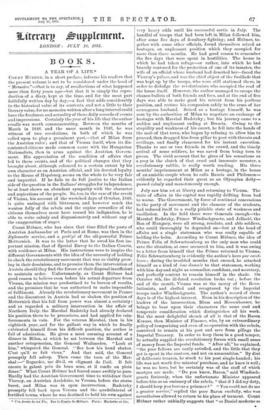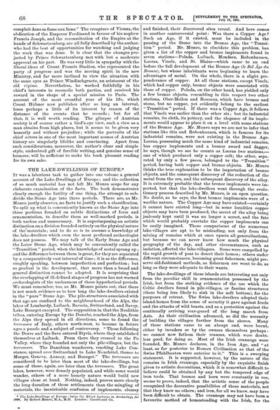BOOKS.
A YEAR OF A LIFE.* COUNT ROHNER, in a short preface, informs his readers that the present volume is not to be considered under the head of " Memoirs "—that is to say, of recollections of what happened more than forty years ago—but that it is simply the repro- duction of a diary, kept at the time, and for the most part faithfully written day by day,—a fact that adds considerably to the historical value of its contents, and not a little to their literary value, for no memoirs written after a long interval could have the freshness and actuality of these daily records of events and impressions. Certainly the year of his life that the author recalls was worth commemorating. Between the months of March in 1848, and the same month in 1849, he was witness of two revolutions, in both of which he was called upon to play a prominent part,—that of Milan from the Austrian ruler ; and that of Vienna itself, when its dis- contented citizens made common cause with the Hungarian Nationalists, then in arms against the Austrian Govern- ment. His appreciation of the condition of affairs that led to these events, and of the political changes that they brought about, although coloured to a certain extent by his own character as an Austrian official, and his devoted loyalty to the House of Hapsburg, seems on the whole to be very fair and impartial. If he fails to do full justice to the Italian side of the question in the Italians' struggles for independence, he at least shows an abundant sympathy with the character and aspirations of the people. So, too, in the case of the revolt of Vienna, his account of the wretched days of October, 1848, is quite untinged with bitterness, and however much the wanton folly of the rebels and the supine cowardice of the citizens themselves must have roused his indignation, he is able to write calmly and dispassionately and without any of the exaggeration of anger.
Count Hauer, who has since that time filled the posts of Austrian Ambassador at Paris and at Rome, was then in the diplomatic service, and a protegg of the all-powerful Prince Metternich. It was to the latter that he owed his first im- portant mission, that of Special Envoy to the Italian Courts, with residence at Milan. His instructions were to inspire the different Governments with the idea of the necessity of holding in check the revolutionary movement that was so visibly grow- ing in their dominions, and to promise them the intervention of Austria should they find the forces at their disposal insufficient to maintain order. Unfortunately, as Count Hiibner had good reason to believe even before his actual departure from Vienna, the mission was predestined to be barren of results, and the promises that he was authorised to make impossible of fulfilment. Already the revolutionary movement in France and the discontent in Austria had so shaken the position of Metternich that his fall from power was almost a certainty ; and as regarded a military intervention in the affair of Northern Italy, the Marshal Radetzky had already declared his position there to be precarious, and had applied for rein- forcements in vain. For the veteran Marshal, then in his eightieth year, and for the gallant way in which he finally • extricated himself from his difficult position, the author is full of admiration. He gives a most amusing account of a dinner in Milan, at which he sat between the Marshal and another octogenarian, the General Wallmoden. " Look at him," whispered the General. " See how his hand shakes. C'est gull se fait vieux." And that said, the General promptly fell asleep. Then came the turn of the Mar- shal —" Regardez, me dit-il, en clignant de l'ceil. II fait encore le galant pres du beau sere, et it ronfle en plein. diner." What Count Hiibner had feared came swiftly to pass. Hardly had the Austrian Government time to withdraw their Viceroy, an Austrian Archduke, to Verona, before the storm burst, and Milan was in open insurrection. Radetzky promptly fell back upon Verona and the quadrilateral of fortified towns, -where he was destined to hold his own against
Une Annie de ma Vie. Par le Comte de Hubner. Paris : Hachette et Cie.
very heavy odds until his successful sortie in July. The handful of troops that had been left in Milan followed him, after some five days of desultory fighting ; and Hilbner, to- gether with some other officials, found themselves seized as hostages, an unpleasant position which they occupied for more than three months. He had good reason to remember the five days that were spent in hostilities. The house in which he had taken refuge—or rather, into which he had bravely ventured for the protection of one of its inmates, the wife of an official whose husband had deserted her—faced the Viceroy's palace, and was the chief object of the fusillade that was kept up by the troops, who were still stationed there, in order to dislodge the revolutionists who occupied the roof of the house itself. However, the author managed to escape the chance-bullets of both friends and foes, and at the end of five days was able to make good his retreat from his perilous position, and restore his companion safely to the arms of her courageous husband. Seized as a hostage himself, he was sent by the authorities of Milan to negotiate an exchange of hostages with Marshal Radetzky ; but his journey came to a sudden and unpleasant ending at Brescia. Owing to the stupidity and weakness of his escort, he fell into the hands of the mob of that town, who began by refusing to allow him to proceed, then dragged him from pillar to post with threats and revilings, and finally clamoured for his instant execution. Thanks to one or two friends in the crowd, and the timely arrival of some soldiers, he was saved from being torn to pieces. The vivid account that he gives of his sensations as a prey in the clutch of that cruel and insensate monster, a revolutionary rabble, is really worth reading. His three months' imprisonment at Milan as a hostage, in the house of an amiable couple whom he calls Baucis and Philemon— evidently he regarded their guest as an Olympian deity— passed calmly and monotonously enough.
July saw him set at liberty and returning to Vienna. The state of affairs in the capital was rapidly drifting from bad to worse. The Government, by force of continual concessions to the party of movement and the clamour of the students, had reduced itself to a really pitiable state of weakness and vacillation. In the field there were Generals enough—the Marshal Radetzky, Prince Windischgraetz, and Jellacie, the Ban of Hungary, were all strong, resolute, and able soldiers, who could thoroughly be depended on—but at the head of affairs not a single statesman who was really capable of holding the helm. According to Count Hiibner, the idea of Prince Felix of Schwartzenberg as the only man who could save the situation, at once occurred to him, and it was owing to a letter from himself that the Prince returned to Vienna. Felix Schwartzenberg is evidently the author's hero par excel- lence ; during the troubled months that ensued, he attached himself as a kind of clew damnk to that statesman, working with him day and night as counsellor, confidant, and secretary, and perfectly content to remain himself in the shade. On October 6th, the ill-fated revolution broke out ; before the end of the month, Vienna was at the mercy of the Revo- lutionists, and shelled and recaptured by the Imperial troops under Windischgraetz. The author's record of those days is of the highest interest. Even in his description of the leaders of the insurrection, Blum and Messenhauser, he brings to bear upon their characters the same cool and temperate consideration which distinguishes all his work. But the most delightful sketch of all is that of the Baron Krauss, then Minister of Finance, who, by an extraordinary policy of temporising and even of co-operation with the rebels, contrived to remain at his post and save from pillage the Imperial Treasury. In order to keep them, in a good temper, he actually supplied the revolutionary forces with small same of money from the Imperial funds. " After all," he explained, "the poor fellows are easily satisfied, and the little that they get is spent in the canteen, and not on ammunition." By dint of deliberate treason, he stuck to his post single-handed ; his life was not worth five minutes' purchase, and he knew it well ; he was no hero, but he certainly was of the stuff of which martyrs are made. "Do you know, Baron," said Windisch- graetz furiously, when the unfortunate Minister appeared before him as an emissary of the rebels, " that if I did my duty, I should keep you here as a prisoner P" " Yon could not do me a greater service," replied the poor Baron ruefully, who was nevertheless allowed to return to his place of torment. Count Hubner rather unkindly suggests that "ce Daniel moderne se
complait dans sa fosse aux lions." The recapture of Vienna, the abdication of the Emperor Ferdinand in favour of his nephew Francis Joseph, and the reconstitution of the Empire at the hands of Schwartzenberg, are all fully described by the author, who had the best of opportunities for watching and judging the work that was done. It is clear that the changes pro- jected by Prince Schwartzenberg met with but a moderate approval on his part. He was very little in sympathy with the liberal ideas of Count Francis Stadion, who represented the party of progress and was the moving spirit in the new Ministry, and far more inclined to view the situation with the same eyes as Prince Windischgraetz, an aristocrat of the old rggime. Nevertheless, he worked faithfully in his chief's interests to reconcile both parties, and received his reward in the shape of a special mission to Paris. The account of the most eventful year of his life, which Count Hubner now publishes after so long an interval, loses perhaps a little of its interest by reason of the distance of the events that he records ; but for all that, it is well worth reading. The glimpse of Austrian society is of course rather a bird's-eye view, such a view as a man obtains from high places, but it seems to be given very honestly and without prejudice ; while the portraits of the chief actors in one of the most important scenes of Austrian history are singularly lifelike and convincing, Apart from such considerations, moreover, the author's clear and simple style, undoubted gift of forcible writing, and genuine sense of humour, will be sufficient to make his book pleasant reading for its own sake.



















































 Previous page
Previous page